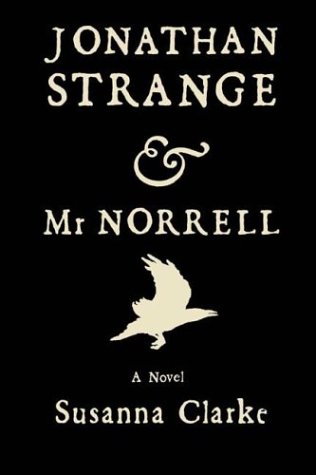Book Review: Susanna Clarke’s “Jonathan Strange & Mr. Norrell”
by Miles Raymer
Susanna Clarke’s Jonathan Strange & Mr. Norrell is a bewitching but almost unbearably bloated novel. Deftly mimicking the oblique style of Jane Austen, Clarke resurrects the concerns, mannerisms and values of early-19th century England. Into this historical milieu she chucks a fabricated history of “English magic,” a longstanding but recently stagnant tradition waiting to be reinvigorated by the novel’s two eponymous gentlemen. Weighing in at 1000+ pages, it’s an ambitious project that’s as impressive as it is tiresome.
Novels of exorbitant length invariably contain a set of internal, self-justificatory propositions to be examined and judged by the reader (i.e. Why should I read this one huge book when I could read four others in its stead?). By this account, Strange & Norrell is a mixed bag of failures and successes, one that brought me much closer to quitting a book than any other in recent years. The novel is thoroughly engrossing for the first couple hundred pages, but then idles painfully for the next six or seven hundred before wrapping up with a highly imaginative and satisfactory set of bangs. It’s a meticulous and extensive effort, especially given that this is Clarke’s first novel. However, unnecessary length is not the only offending factor here. The relationships between Clarke’s main characters coalesce so slowly that it’s hard to connect with any of them until well past the point where many unenthused readers will have abandoned the book altogether. Bogged down by numerous purple patches designed to tout Clarke’s knowledge of Napoleonic Wars-era Europe, the book forgets to feed its emotional center until the very end.
The good news is that something truly wondrous awaits readers who manage to plod through Strange & Norrell’s ponderous midsection. The story is peppered with acute insights about the nature of academic pursuits (practical vs. theoretical approaches), the tension between cooperative and competitive instincts, and the highly moral question of not only how to best facilitate the democratization of knowledge, but also if such a thing is actually possible. Mr. Norrell, a well-meaning but miserly scholar, spends a lifetime amassing a huge private library of magical texts in order to render himself English magic’s sole informed practitioner. When the young, impulsive, and deeply intuitive Jonathan Strange emerges as a rival magician, the two strike up a tenuous alliance, the survival of which is the crux of Clarke’s overarching narrative.
While Clarke spends far too much time on ancillary subplots and literary flights of fancy, through it all she succeeds in bringing Strange and Norrell to a climatic confrontation that reveals their natures as curiously oppositional and integral at once. Eschewing the easy logic of monolithic heroism, the uneasy friendship between these two estimable gentlemen spells out a worthy lesson: to overcome our biggest obstacles, humans must learn to harmonize our proclivities and habits (no matter how finicky or parochial), thereby generating collective responses that would otherwise be unavailable to discrete individuals. The consolidation of power and knowledge––a goal sought by Norrell with the best of misguided intentions––becomes untenable in light of the novel’s final revelations.
At its frustratingly elusive core, Strange & Norrell is a truly magical story that posits the natural world as a kind of endlessly intricate, constantly unfolding and universally accessible spell. This notion is perhaps best captured by Jonathan Strange, who imparts this message from the depths of magical Darkness:
England is full of magicians. Hundreds! Thousands perhaps! Norrell refused them. Norrell denied them. Norrell silenced them. But they are magicians nonetheless. Tell them this…Tree speaks to stone; stone speaks to water. It is not so hard as we have supposed. Tell them to read what is written in the sky. Tell them to ask the rain! (858)
Rating: 6/10
